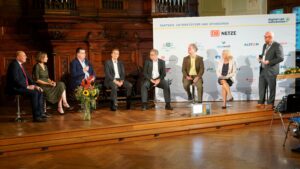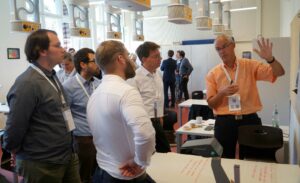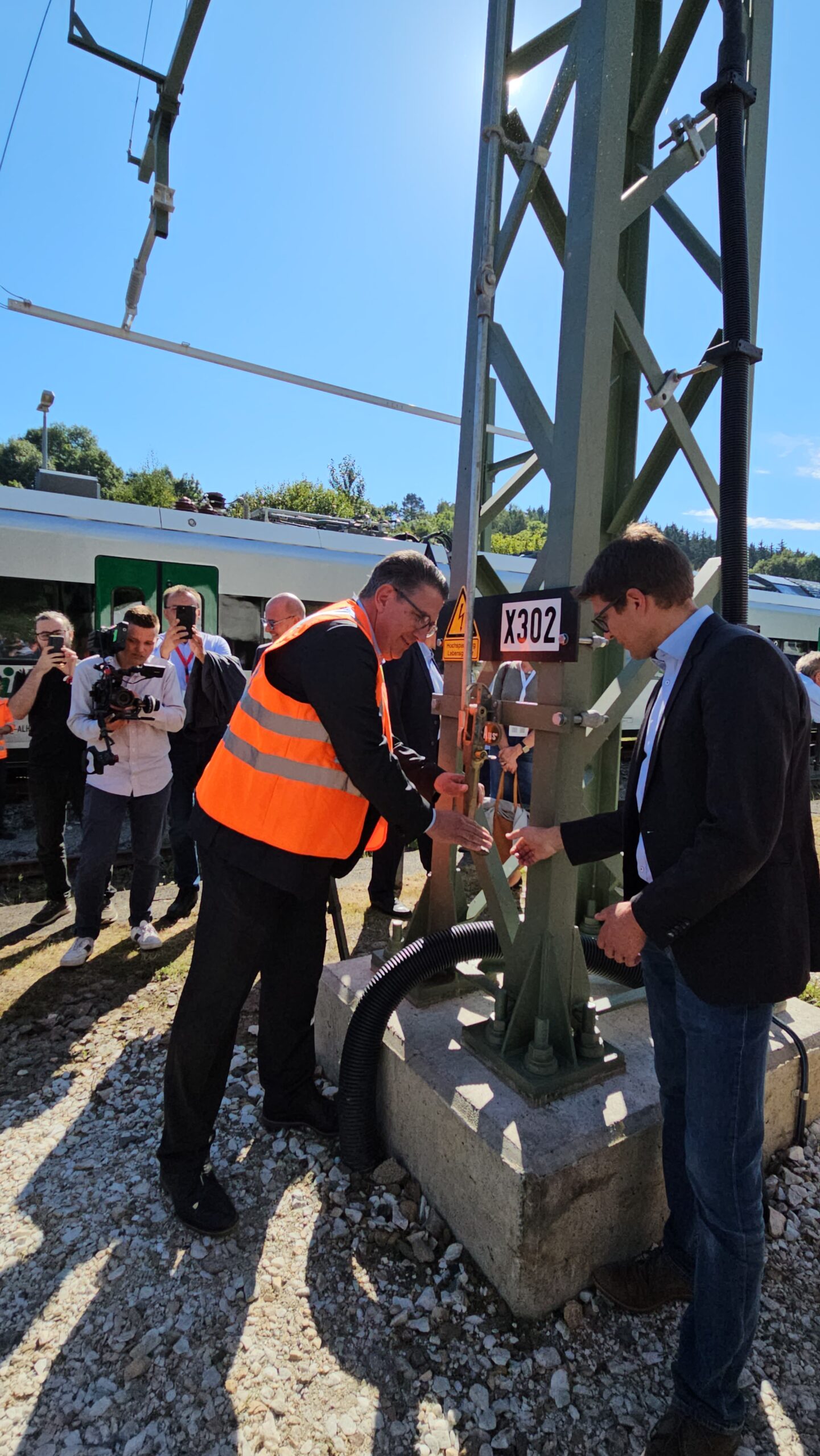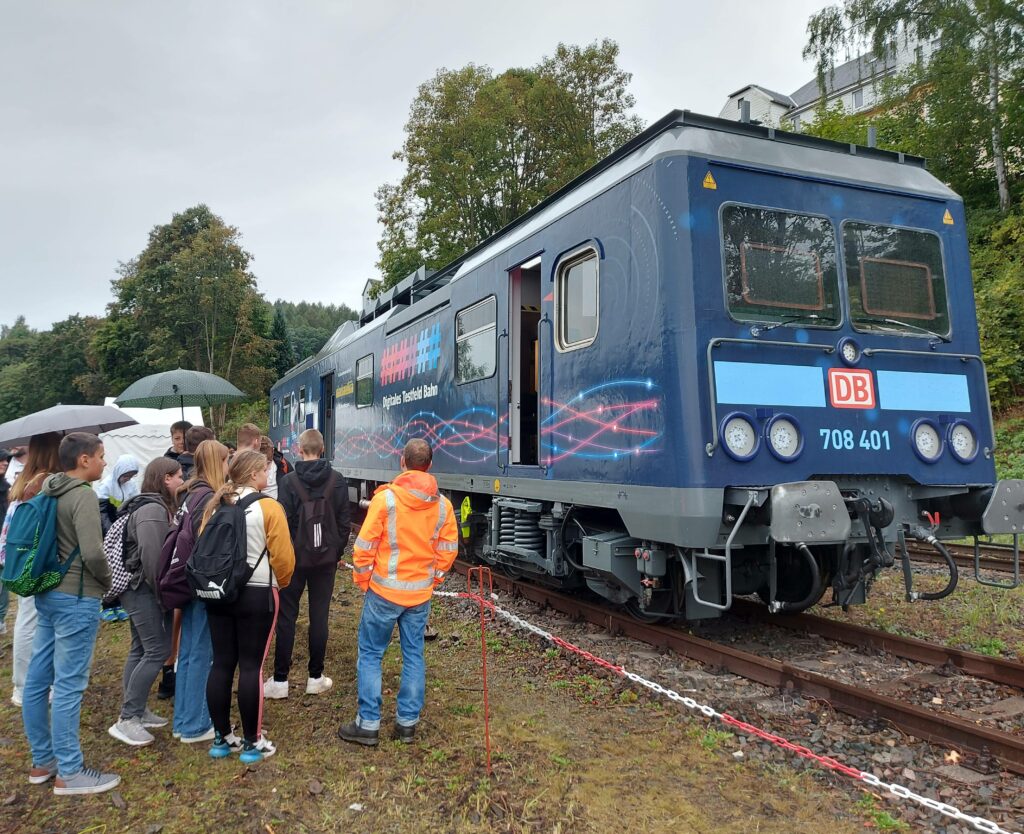Review: Digital Rail Convention 2023

Annaberg-Buchholz – For the third time now, the Digital Rail Convention was held in the past week in the capital of the Ore Mountains. This biennial congress event, which took place from September 20th to 22nd this year, once again proved to be a groundbreaking event for the rail transport industry and the future of mobility. With over 300 international participants, the event provided a platform for intense and sustainable exchange among scientists, professionals, and enthusiasts.
Three Days Dedicated to Rail Transport
Over 300 international railway and mobility researchers and experts gathered at the Smart Rail Connectivity Campus to discuss and experience the future of rail transport and mobility through various workstreams, presentations, and demonstrations. The conference covered topics such as the use of the latest generation mobile communication standards 5G and 6G, digital signaling and safety technology, as well as resource-efficient alternative propulsion technologies.
The Sector Initiative Digitale Schiene deutschland of Deutsche Bahn AG also supported the event by providing insights into their testing and research activities along the Testbed operated by DB RegioNetz. For the DRC, the advanced TrainLabs – two laboratory ICE trains equipped with state-of-the-art measurement and information technology – operated for demonstration rides on the test track between Annaberg-Buchholz and Markersbach.
The Conference Day on Wednesday, September 20, 2023
The Digital Rail Convention spanned three days and offered various event formats catering to different target audiences. On Wednesday, September 20, 2023, the Conference Day was tailored for representatives from industry, research, and politics. Here, current topics were discussed in three-hour workstreams, and presentations were made. Our guests showed great interest in the workstreams, as exciting demonstrations were expected the following day. These included the workstream by Digitale Schiene Deutschland on “FRMCS based on 5G” and the workstream by Rail Power Systems, the Technical University of Dresden, and the Verkehrsverbund Mittelsachsen on “Electric Charging of BEMU Vehicles.” The Workstream “Innovationsforum ‘Sensor Solutions for Rail'” event by the German Center for Rail Traffic Research at the Federal Railway Authority (DZSF) and TU Chemnitz, which aims to kickstart a series of events for networking to enhance sensor utilization in the railway system, also saw significant attendance.
Additionally, this year, guests participated in an international panel discussion featuring:
- Ines Fröhlich (State Secretary for Digitalization and Mobility – Saxon Ministry of Economy, Labour, and Transportation)
- Dr. Birgit Milius (Head of the Department of Railway Operation and Infrastructure, TU Berlin, and President of VDEI)
- Kristian Weiland (Head of Development Digitale Schiene Deutschland, CTO DB Netz AG)
- Guido Rumpel (Head of Rail Infrastructure Germany, Siemens Mobility GmbH)
- Dr. Uwe Götze (Vice President for Transfer and Continuing Education at TU Chemnitz, Holder of the Chair of Corporate Accounting and Controlling, and 1st Chairman of SRCC e.V.)
- Michael Meyer zu Hörste (Chief Engineer, German Aerospace Center, Institute of Traffic System Technology)
- Rudolf Heidu (Technical University of Prague)
The discussion touched upon the cross-border cooperation between Germany and the Czech Republic in railway research areas and the challenges both countries anticipate in this field.



The Demo Day on Thursday, September 21, 2023
Thursday was designated as the Demo Day and took place at Annaberg-Buchholz Unterer Bahnhof (location of SRCC), Annaberg-Buchholz Süd (site of the 50-Hertz charging station), and Schlettau railway station. These locations featured tours, presentations, and demonstrations for industry professionals, culminating in the inauguration of the battery-electric train charging station, a highlight of the Digital Rail Convention. This cutting-edge facility enables emission-free rail transport on previously unelectrified routes. The charging station relies on an innovative symmetrical inverter capable of flexibly responding to the power requirements of battery-electric rail vehicles. This breakthrough provides a solution for regions where rail lines are not electrified. In such areas, the power grid has limited capacity and provides single-phase power supply, while battery-electric rail vehicles require single-phase charging. The required balancing is achieved with minimal effort through the symmetrical inverter. The development of the charging station was carried out by a consortium of regional and national companies, as well as the Technical University of Dresden, under the project coordination of the Smart Rail Connectivity Campus (SRCC). Companies like Rail Power Systems GmbH, F&S PROZESSAUTOMATION GmbH, Verkehrsverbund Mittelsachsen GmbH, TU Dresden, and DB Energie GmbH played a crucial role in realizing this project. DB RegioNetz Infrastruktur GmbH Erzgebirgsbahn also actively supported the implementation of the charging station.
Additionally, demonstrations took place on the Demo Day at the Annaberg-Buchholz Süd and Schlettau locations. These included demonstrations by TU Chemnitz, Smart Mobile Labs, and Vodafone. At the Schlettau station, the demonstrator of the TIMS project (Train Integrity Monitoring System) was showcased. It consisted of a device attached to the front of a locomotive (“Head of Train Device”) and another device attached to the end of a freight car (“End of Train Device”). Both devices communicated with each other and exchanged measurements to monitor their distance from each other and thus ensure train integrity. The system operated precisely as expected and delivered the desired results. Monitoring train integrity is a prerequisite for increasing railway line capacity through virtual or moving block operation. Parallelly, Smart Mobile Labs and Vodafone provided insights into laboratory work, demonstrating how, with nearly real-time camera and 5G transmission technology, shunting without a shunting conductor could look in the future.
As a conclusion to the Demo Day, we visited the locomotive shed of the Verein Sächsischer Eisenbahnfreunde (Saxon Railway Enthusiasts Association) in Schwarzenberg, a place familiar to our association members and previous DRC participants. Here, in a relaxed atmosphere, our networking event took place, allowing our guests to exchange ideas once more and enjoy a great time.
The Public Day on Friday, September 22, 2023
The Public Day primarily targeted school classes and the interested public. Shuttle services and various activities were available between the three locations. At the career orientation booths organized by SRCC’s network partners, DRC guests could learn about career opportunities in and around the railway industry. In addition, through experiments, demonstrators, and presentations, concrete insights were provided into the fields and tasks in STEM-related professions (Science, Technology, Engineering, and Mathematics). Another highlight for visitors was the opportunity to tour both the mechanical and digital signal boxes, as well as two cutting-edge train systems – Alstom’s BEMU and a laboratory train from Digitale Schiene Deutschland. The diverse offerings attracted schools from the entire Ore Mountains region, providing students with added educational value, career guidance, and deeper exploration of their interests in STEM fields. New interests in STEM were also encouraged through offerings like the Hacker School and various experimental booths, with the aim of sparking early enthusiasm for the railway sector and addressing the shortage of skilled professionals.

Conclusion: A Milestone for Rail Transport and the Future of Mobility
The Digital Rail Convention 2023 once again emphasized the importance of exchanging knowledge and experiences within the rail transport industry, as well as linking theoretical deliberations with practical implementation. The commissioning of the 50-Hertz charging station marked a breakthrough towards emissions-free rail transport on unelectrified routes. The conference provided an excellent opportunity for experts from various industries and specializations to exchange ideas, highlighting the vital role that modern rail transport will play in implementing alternative propulsion and energy supply concepts for climate protection. The future of rail transport looks promising, and the Digital Rail Convention has made a significant contribution to this vision.
For all guests interested in staying connected with the Smart Rail Connectivity Campus and supporting its activities even after the DRC, we invite you to join SRCC e.V. The association’s network not only provides valuable contacts with industry, research, and politics but also offers the opportunity to participate in other outstanding events such as the Smart Rail Enquete. If you are interested, please feel free to reach out to us! We look forward to welcoming you!